It stood for 62 years and helped earn New Hampshire’s 6,288-foot Mt. Washington the distinction of having the World’s Worst Weather. Yet, more than a decade ago, a little known tropical cyclone in the South Indian Ocean blew away Mt. Washington’s famous gust of 234 mph — the previous fastest wind ever measured on Earth outside of a tornado. According to the World Meteorological Organization (WMO), the record now belongs to Barrow Island, Australia, a spot of land 31 miles off that continent’s northwest coast that was blasted by Tropical Cyclone Olivia on April 10, 1996. Olivia delivered a record gust of 253 mph (408 kph).

A panel of scientists charged with determining global weather and climate extremes as part of the WMO’s Commission for Climatology (CCl) recently reviewed numerous exceptional wind gusts recorded on Barrow Island during Olivia. They concluded that five peak gusts, ranging from 186 mph to the peak of 253 mph were indeed accurate. The other gusts measured 229 mph, 233 mph, and 215 mph, lending credibility to the record wind. The scientists concluded that a mesovortex in Olivia’s well-defined eyewall was likely the cause of the extreme winds.
But the record wind went unnoticed for a decade before the panel happened upon the observations from Barrow Island. Already stunned by losing the record wind gust distinction, Mt. Washington Observatory Executive Director Scot Henley told the Associated Press he was shocked the record remained hidden so long.
“Somehow it fell through the cracks and the Australians didn’t think it was a big deal,” he stated. “We hear that, and it kinds of blows our minds.”
Well, it might not have been quite as simple as that, as Jeff Masters of Weather Underground reports in his blog. He writes that Australia’s Bureau of Meteorology (BOM) was notified about the gusts, but considered them suspect since they were extraordinarily high for a 145 mph tropical cyclone, and because the accuracy of the equipment used to measure the gusts was unknown. Even after a paper on the extreme wind was written in 1999, the data remained in wait another 10 years until someone with the BOM resurrected it and brought it to the attention of the CCl. Read more about why it took 14 years for the record wind to be recognized.
The CCl panel determined the instrument that measured the record wind was a “heavy duty three-cup Synchrotac anemometer,” its report states. It was located near the center of Barrow Island and positioned 33 feet (10 m) above ground level and 210 feet (64 m) above sea level in relatively open terrain. Guy wires stabilized the cyclone-rated Hills telescoping mounting tower, and the anemometer was found to be regularly inspected and calibrated.
According to Wikipedia, Barrow Island, which is slightly larger than Brooklyn, New York, was uninhabited until the 20th century. Oil was discovered there in commercial quantities in 1964 and subsequent drilling resulted in Barrow Island becoming Australia’s leading producer of petroleum and natural gas. The anemometer that measured the world’s new fastest surface wind is owned and maintained by Chevron.
A report of the record wind is posted on the Arizona State University Web site. It contains additional details of Olivia’s record event and names the report’s panel of experts within CCl.
Uncategorized
An Expanding Security Role for the Military
On Tuesday, the Introduction to Environmental Security and Climate Change presented by John Lanicci and James Ramsay of Embry-Riddle Aeronautical University broadened the scope of national security issues to include extreme environmental events and climate anomalies, the destabilizing effects of these events, and the potential security implications.
In this clip, Lanicci discusses the accompanying chart from the U.S. Transportation Command.
A Plea for Collaboration
Wednesday’s panel discussion on the Evolution of Hydromet and Climate Services emphasized the need for the health and climate communities to work together more closely. In this context, Kris Ebi of the IPCC made a direct request to federal agencies and journal editors about papers involving multiple disciplines. Listen to the clip here.
Weather and Water at the Robert E. Horton Lecture
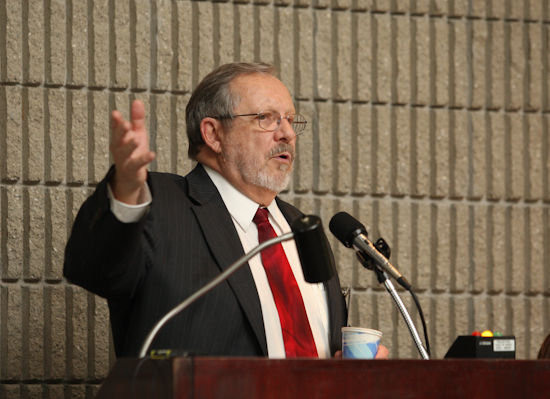
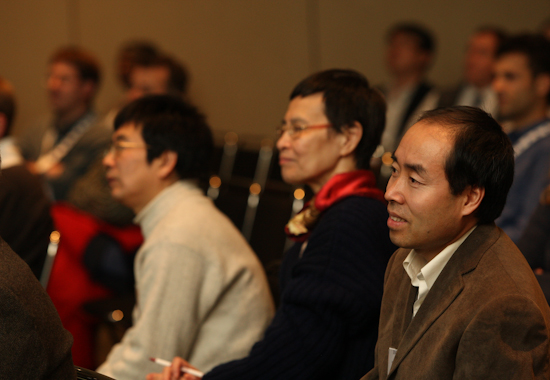
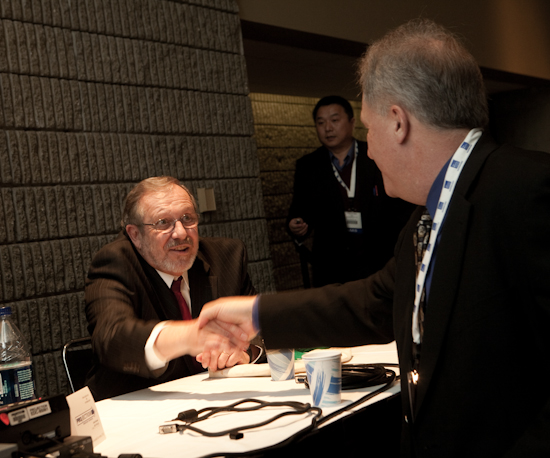

International Dinner Provides Global Flavor
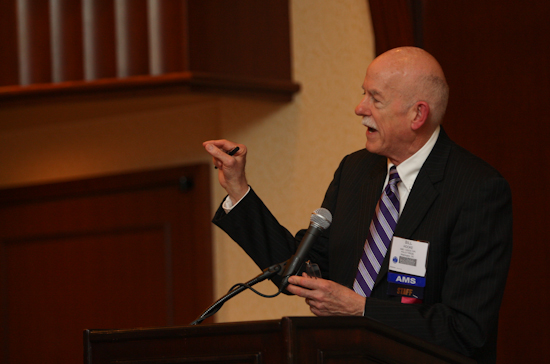
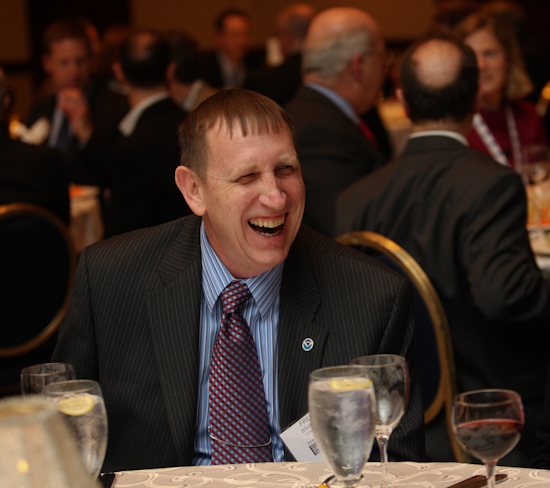

"An Incredible Experience"
The AMS/UCAR Congressional Science Fellowship is a unique opportunity for scientists to become involved in the policy process on Capitol Hill. On Tuesday, the current AMS fellow and two former fellows gathered to discuss some of their experiences and dispense advice to potential applicants.
The 2009-10 AMS Congressional Fellow is Jonah Steinbuck, who received his Ph.D. in environmental fluid mechanics and hydrology from Stanford University in 2009. Steinbuck describes his work as a fellow for Representative Edward Markey (D-MA) in the Select Committee for Energy Independence and Global Warming as an “incredible experience.”
Steinbuck noted that he chose working with Markey and the Select Committee for a number of reasons: 1) because of his interest in climate policy and his belief that the Select Committee gave him the best opportunity to pursue that interest, 2) because “Chairman Markey is one of the leaders in environmental and energy issues,” and 3) because of the Select Committee staff, which allows him to be “a sponge absorbing information” from “some of the best climate policy talent on Capitol Hill.”
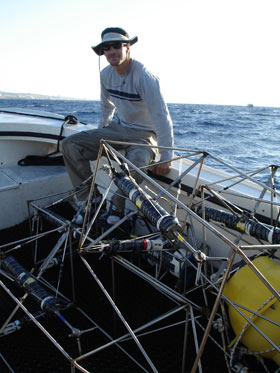
Perhaps the highlight of Steinbuck’s fellowship thus far was his recent trip to the Copenhagen Summit, where he received a credential from the State Department and was able to attend the talks. Steinbuck was particularly impressed with the dramatic conclusion when President Obama negotiated the final text of the agreement with other world leaders.
While the Select Committee awaits the final results of the conference, Steinbuck is also currently tracking EPA regulation of greenhouse gases while monitoring a number of bills proposed to block such regulation from stationary sources.
Past fellows Stephanie Herring and Michael Morgan also spoke about their Congressional Fellowship experiences. Herring, who like Steinbuck served under Congressman Markey in the Select Committee for Energy Independence and Global Warming, is currently working on climate science and service issues as a climate policy analyst in the office of the Department of the Deputy Undersecretary at NOAA. During her time as a fellow, Herring worked on the original version of the legislation that eventually became the Clean Energy and Security Act (also known as the Waxman-Markey Bill). She called the fellowship an ideal transition into new pursuits and in this clip responded to a question on how her fellowship experience enhanced her Ph.D. studies.
Morgan, currently a professor at the University of Wisconsin, recalled his time in Senator Benjamin Cardin’s (D-MD) personal office with fondness, even though, as he explained here, it was the exact opposite of what he originally thought he was looking for in a fellowship experience. Morgan explained that one of the most important things he learned on Capitol Hill was that “science is not enough”–senators must consider all their legislative priorities and their constituents’ priorities and determine how science fits into that framework.
The speakers cited numerous characteristics that Congressional Fellowship applicants should have: analytic skills, interpersonal skills, awareness of federal policy, an understanding of the role and limits of science in federal policy, diplomacy and political acumen, a sense of ethics, and perhaps most importantly, a legitimate interest in policy that has been displayed in their academic career. They noted that the competition for the fellowship is considerable and that the scientific records of most applicants is outstanding.
Applications for the 2010-2011 fellowship are due by February 10.
We Told You There Would Be Cake. . .
 . . . but we may have neglected to mention that it would be the coolest weather-related cake you’ve ever seen! The confectionary delight was a highlight of Monday’s AMS book launch party and celebrated the 2009 release of The AMS Weather Book by Jack Williams.
. . . but we may have neglected to mention that it would be the coolest weather-related cake you’ve ever seen! The confectionary delight was a highlight of Monday’s AMS book launch party and celebrated the 2009 release of The AMS Weather Book by Jack Williams.
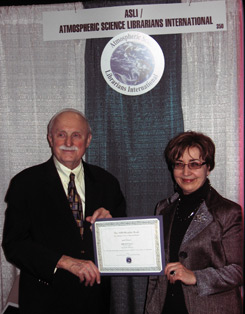
A few minutes later, in a special ceremony, the accolades for Jack continued when he received an honorable mention ASLI’s Choice Award in the “popular” category. The fifth annual ASLI’s Choice Awards ceremony will be held on Wednesday at 4:45 p.m. at Publisher’s Row in the Exhibit Hall.
Congratulations to Jack on the success of his book!
A World View at the International Forum
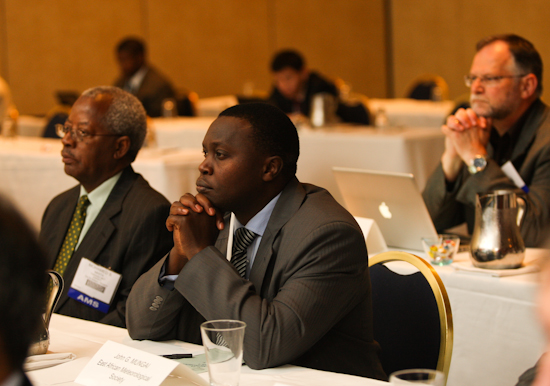


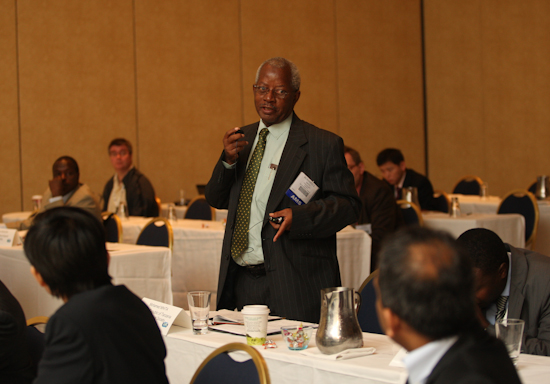
K-12 Education at Home and Abroad
The rewards of teaching the Earth sciences at the K-12 level in the United States are great, but sometimes so are the frustrations. At Monday’s education forum, Sandra Henderson touched on some of these issues in a discussion of recent UCAR surveys of K-12 Earth science teachers.
UCAR, which supports the professional development of science teachers through their “Windows to the Universe” website and other initiatives, generated almost 1,000 responses from National Earth Science Teachers Association (NESTA) members and newsletter subscribers. While making note of one particularly positive development–that teachers now have reasonably good access to technology and utilize it regularly–Henderson also listed the top 10 concerns of science teachers and summarized the surveys’ findings.
So how can these concerns be addressed? American educators might look to their colleagues across the Pacific for a uniquely successful approach to environmental education. In another forum presentation, Michihiko Tonouchi of the Japan Meteorological Business Support Center in Tokyo described a program in Japanese public schools that teaches students about global warming and other environmental issues.
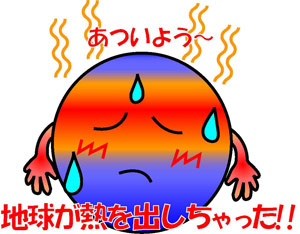
Weather studies in Japan are now a compulsory subject for elementary school fifth-graders and those in their second year of junior-high school. In the program described by Tonouchi, approximately 100 broadcast meteorologists from the Weather Caster Network (WCN) and 300 engineers from Sharp share teaching responsibilities, with the broadcasters explaining basic scientific principles of global warming and the engineers discussing mitigation and adaptation strategies. Quizzes and hands-on experiments are an important part of the instruction. Along with global warming, alternative energy and recycling are also studied.
A website maintained in conjunction with the program provides a forum for student and teacher feedback, as well as activities, articles, and other resources. Tonouchi noted that both students and teachers have enthusiastically embraced the program, and said that the program’s organizers would like to expand the project to the U.S. and other parts of Asia.

